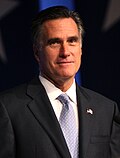| |||||||||||||||||||||||||||||||||||||||||||||||
| |||||||||||||||||||||||||||||||||||||||||||||||
| Elections in North Dakota |
|---|
 |
| | |
|---|---|
| Democratic Party | |
| Republican Party | |
| Minor parties | |
| Related races | |
| |
The 2012 North Dakota Republican presidential caucuses were held on March 6, 2012. [1] North Dakota has 28 delegates to the Republican National Convention; [2] despite Rick Santorum's nominal win in the preference poll conducted during the caucuses, the majority of the delegates elected by the state party convention later in March said they supported Romney. [3]



